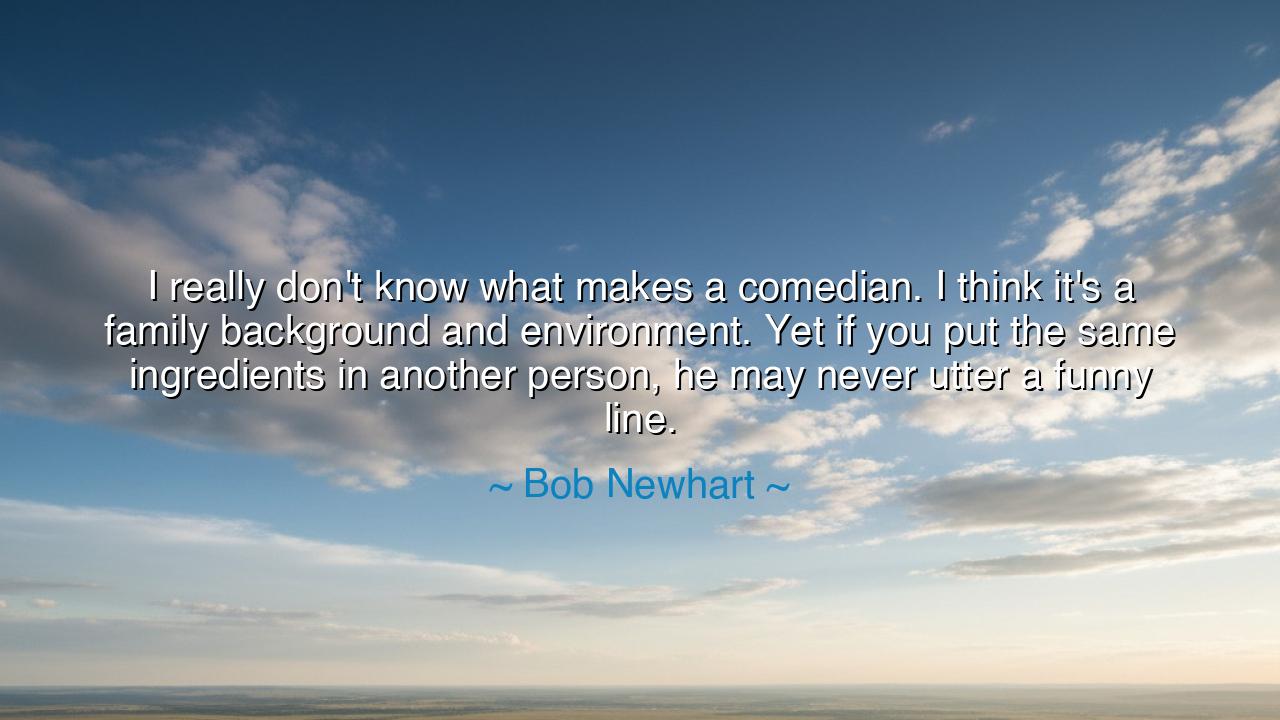
I really don't know what makes a comedian. I think it's a family
I really don't know what makes a comedian. I think it's a family background and environment. Yet if you put the same ingredients in another person, he may never utter a funny line.






“I really don’t know what makes a comedian. I think it’s a family background and environment. Yet if you put the same ingredients in another person, he may never utter a funny line.” — so said Bob Newhart, a man whose humor flowed not from noise or spectacle, but from the quiet observation of life’s absurdities. His words, gentle yet profound, are a meditation on mystery — the mystery of talent, of creation, of the soul’s peculiar design. He speaks as one who has gazed into the forge of laughter and realized that even the craftsman cannot always explain the flame.
To say, “I don’t know what makes a comedian,” is to confess humility before the workings of nature and spirit. The ancients would have said that such gifts are woven by the Muses, not manufactured by man. For while one may learn technique or study timing, true humor — that spark which transforms ordinary truth into laughter — is born from the strange chemistry of the heart. It is the fusion of joy and sorrow, of insight and absurdity, of perception sharpened by pain. Newhart’s uncertainty, then, is not ignorance, but reverence. He understands that some forces are too subtle, too sacred, to be dissected.
He speaks next of family and environment, the soil from which the plant of humor grows. For it is often in the small rooms of childhood, amid shared meals, struggles, and whispered jokes, that the rhythm of laughter is first learned. The child who hears irony in the voice of a weary parent, who learns to make light of hardship, who sees that laughter can heal — this child carries within them the seed of comedy. The ancients knew this well: that laughter is the breath of survival. It is no accident that the oppressed have always been the wittiest; they learned early that humor is freedom’s first rebellion.
Yet Newhart adds a truth more mysterious still: “If you put the same ingredients in another person, he may never utter a funny line.” Here lies the paradox that humbles every artist. For though the elements may be the same — the same upbringing, the same hardships, the same lessons — the spirit within each person stirs them differently. As two blacksmiths may strike the same metal, yet one makes a sword and the other sparks, so too the soul of the comedian forges laughter out of the raw material of life. The gift of timing, the instinct for tone, the ability to see the ridiculous and the sublime at once — these cannot be imitated. They are the fingerprints of destiny.
Consider the example of Charlie Chaplin, born into poverty in the smoke-stained streets of London. Many suffered as he did, but few could turn that suffering into the silent poetry of laughter. His environment gave him hardship, but his spirit gave him art. Where others saw despair, he saw rhythm, irony, and grace. He made the world laugh not because he escaped pain, but because he transformed it. This is what Newhart means: that the ingredients alone are nothing without the alchemy of the soul.
From this truth flows a lesson for all who seek mastery in any craft. You may study the methods of the great, you may surround yourself with their influences, and still, your art will be your own — or it will be nothing. Do not strive to replicate; strive to understand. The family and environment you come from are not prisons but roots; they feed you, but it is your spirit that gives the flower its color. In every field — be it humor, art, leadership, or love — greatness comes not from imitation but from authenticity.
Therefore, let this teaching be passed down: the funny line, like the divine spark, cannot be forced. It is the natural expression of a soul that has listened deeply to life. If you wish to create, begin not by copying the masters, but by observing the world as they did — with curiosity, with compassion, with courage. Laugh at your own follies. Find light even in sorrow. And when you speak, let your words be shaped not by design, but by truth. For what makes a comedian is what makes every great human being — not the ingredients of life, but the mysterious fire that burns within them, turning experience into art, and pain into laughter.






AAdministratorAdministrator
Welcome, honored guests. Please leave a comment, we will respond soon